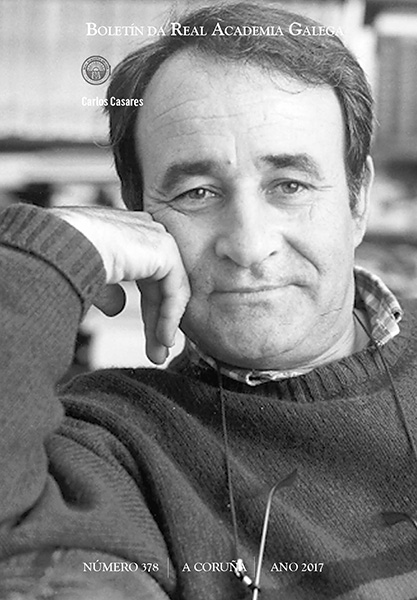A escrita de Carlos Casares: unha poética da descrición literaria
Descargas
Publicado
Cómo citar
Número
Sección
DOI:
https://doi.org/10.32766/brag.378.681Palabras clave:
Carlos Casares, descrición, autopoética, verosimilitude, O sol do veránResumo
As autopoéticas, ou expresións persoais do xeito de concibir a creación literaria, son moi frecuentes no ámbito da poesía e pode afirmarse que son poucos os poetas que non contan con algunha composición de índole metapoética. Mais esta ollada recursiva sobre a propia obra é menos frecuente no eido da narrativa. As análises dos mecanismos creadores, ao xeito de “Filosofía da composición”, de Edgar Allan Poe, concitaron unha enorme atención crítica. Dentro da literatura galega, o caso de Carlos Casares é particularmente interesante desde este punto de vista, porque se trata, sen dúbida, dun dos narradores que revela unha maior autoconciencia e que formulou, de xeito máis explícito, unha reflexión sobre os mecanismos da súa produción, algo que fixo, curiosamente, poñendo a énfase na descrición. Casares confire ao descritivo unha forte relevancia narratolóxica ao facer recaer na “miudeza descritiva” o efecto de verosimilitude e a eficacia do texto narrativo. Revisar a obra do escritor ourensán á luz da súa teoría sobre a descrición literaria e a centralidade que lle atribúe para a eficacia do relato resulta profundamente revelador. No xeito particular e persoal de concibir o texto e a descrición atópase unha clave, tal vez a esencial, para comprendermos os mecanismos narrativos da construción de mundos na obra de Carlos Casares.
Descargas
Citas
Abrams, Meyer Howard (1958): The mirror and the lamp: Romantic Theory and the Critical Tradition. New York: The Norton Library.
Adam, Jean-Michel (1993): La description. Paris: Presses Universitaires de France.
Adam, Jean-Michel e André Petitjean (1989): Le texte descriptif: poétique historique et linguistique. Paris: Nathan.
Bachelard, Gaston (1957): La poétique de l’espace. Paris: Presses Universitaires de France.
Cabo Aseguinolaza, Fernando (2001): Infancia y modernidad literaria. Madrid: Biblioteca Nueva.
Casares, Carlos (1967): Vento ferido. Vigo: Galaxia.
Casares, Carlos (1975): Xoguetes pra un tempo prohibido. Vigo: Galaxia.
Casares, Carlos (1996): Deus sentado nun sillón azul. Vigo: Galaxia.
Casares, Carlos (1998a): Un país de palabras. Vigo: Galaxia.
Casares, Carlos (1998b): Ilustrísima. Vigo: Galaxia.
Casares, Carlos (2002): O sol do verán. Vigo: Galaxia.
Cicerón, Marco Tulio (1996): De oratore. Cambridge: Harvard University Press.
Hamon, Philippe (1991): La description littéraire. Anthologie de textes théoriques et critiques. Paris: Macula.
Hamon, Philippe (1993): Du descriptif. Paris: Hachette. (Corresponde a unha 4ª ed. de Introduction à l’analyse du descriptif, publicado por primeira vez en 1981, Paris: Hachette. Ademais do cambio de título introdúcense mínimas modificacións).
Hernández, Pedro (1995): “Os mortos daquel verán na traxectoria narrativa de Carlos Casares”, Grial 127, 383-393.
Hill, Forbes I. (1983): “La Retórica de Aristóteles”, en James J. Murphy (ed.), Sinopsis histórica de la retórica clásica. Madrid: Gredos, 34-116.
Homero (2013): Ilíada. Madrid: Consejo Superior de Investigaciones Científicas. Edición de José García Blanco y Luis M. Macía Aparicio.
Horacio Flaco, Quinto(2010): Arte poética. Madrid: Dykinson. Edición de Juán Gil.
Jouve, Vincent (1997): “Espace et lecture: la fonction des lieux dans la construction du sens”, en Gérard Lavergne (ed.), Création de l’espace et narration littéraire. Colloque International Nice-Séville, 6-7-8 mars 1997. Cahiers de Narratologie 8. [Nice]: Association des Publications de la Faculté des Lettres de Nice, 177-191.
Lausberg, Heinrich (1960): Handbuch der Literarischen Rhetorik. Eine Grundlegung der Literaturwissenschaft. München: Hueber. [Tradución ao castelán de José Pérez Riesco: Manual de retórica literaria. Madrid: Gredos, 1967].
Lessing, Gotthold Ephraim (1766): Laokoon: oder über die Grenzen der Malerei und Poesie. Berlin. Voß. [Tradución ao castelán de Eustaquio Bariau: Laocoonte. Madrid: Editora Nacional, 1977].
Mejía Ruiz, Carmen (1997): “Artificios narrativos en Deus sentado nun sillón azul de Carlos Casares”, Revista de Filología románica 14, vol. 2, 290-297.
Quintiliano, Marco Fabio (1963): Institutio oratoria. London: William Heinemann LTD. Edición bilingüe de H. E. Butler.
Ricardou, Jean (1973): Le Nouveau Roman. Paris: Le Seuil.
Riffaterre, Michael (1973): “Interpretation and descriptive poetry: a reading of Wordsworth’s Yew-Trees”, New Literary History 4 (2), 229-256.
Riffaterre, Michael (1990): Fictional truth. Baltimore: John Hopkins University Press.
Robbe-Grillet, Alain (1963): Pour une nouveau roman. Paris: Minuit.
Rodríguez González, Olivia (2004): “Carlos Casares e Emilia Pardo Bazán: os enigmas da vida en O sol do verán e La Madre Naturaleza”, La Tribuna 2, 157-176.
Roger, Alain (1997): Court traité du paysage. Paris: Gallimard.
Rushdie, Salman (1991): Imaginary homelands. Essays and Criticism 1981-1991. London: Granta Books.
Shakespeare, William (1993): Hamlet. Vigo: Galaxia. Edición de Miguel Pérez Romero.
Shakespeare, William (1995): A midsummer night’s dream. Oxford: University Press. Edición de Thomas L. Berger.
Smethurst, Paul (2000): The Postmodern Chronotope. Reading Space and Time in Contemporary Fiction. Amsterdam: Rodopi.
Tarrío Varela, Anxo (2003): “A obra narrativa de Carlos Casares”, Revista galega do ensino 38, 15-45.
Williams, Raymond (1973): The Country and the City. London: Chatto & Windus.
Woolf, Virginia (2004): As ondas. Vigo: Galaxia. Edición de María Cuquejo.











